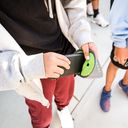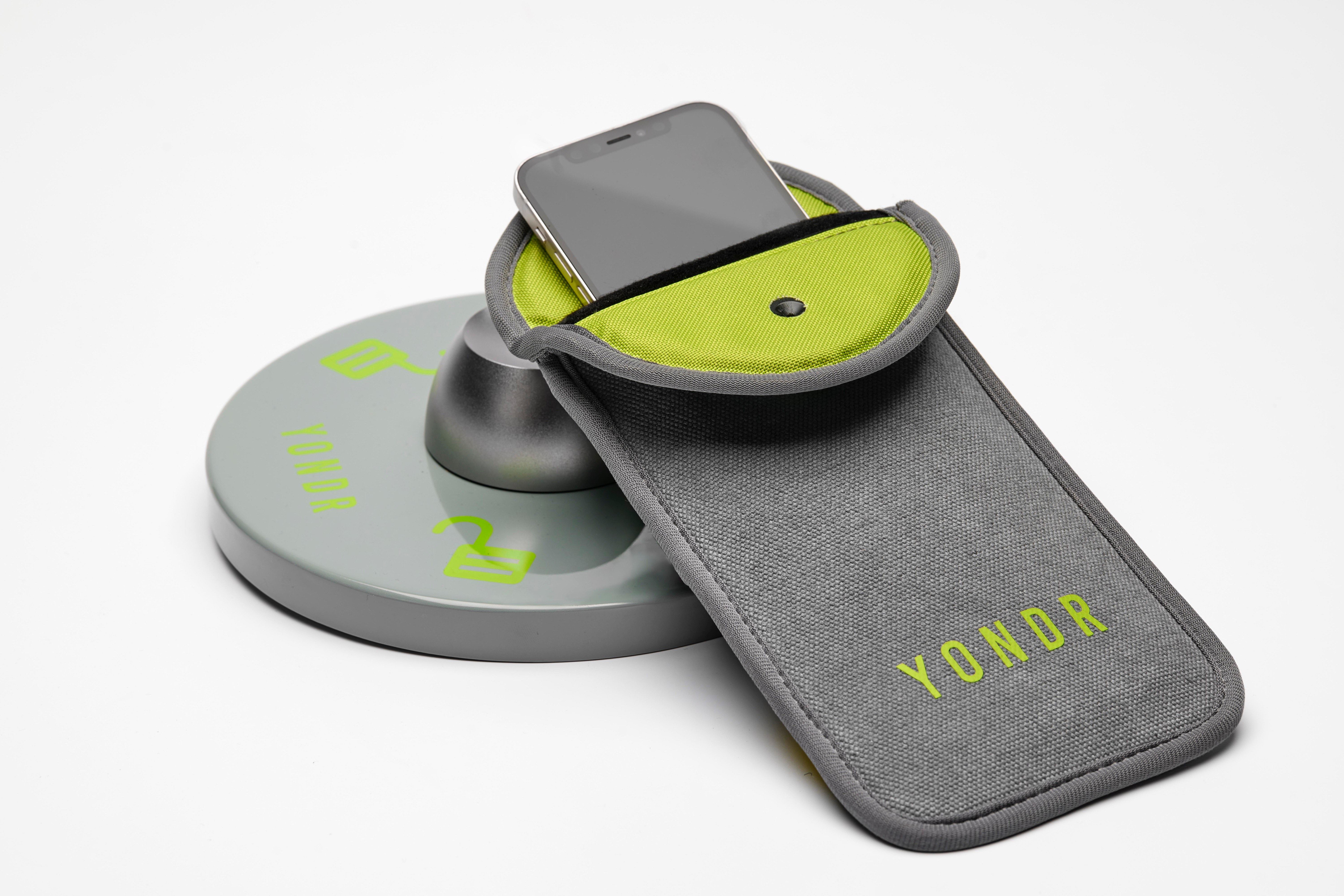The new school essential: A Yondr cellphone pouch

A company called Yondr that sells lockable cellphone pouches is rapidly cornering the market in K-12 schools, as educators crack down on texting and social media use during class.
Why it matters: Banning cellphones in schools doesn't get students to stop using them there — but forcing them to use a Yondr pouch, which gets unlocked as they leave school, is working.
Driving the news: Quietly and with little marketing, Yondr has become the de facto standard for schools that want to solve the ubiquitous cellphone problem.
- Yondr was founded a decade ago by Graham Dugoni, a former soccer pro whose original goal was to banish cellphones from concerts.
- The magnetic pouch — which Dugoni first pitched door to door to Bay Area schools and music venues — requires a proprietary device to unlock.
"Everything we've done has been by referral and word-of-mouth," Dugoni said at a recent conference for school superintendents.
- "We've gone school to school, and schools have helped us develop a program that works."
How it works: Each student is assigned a Yondr pouch — "like a textbook," Dugoni said.
- When students get to school, they have to lock their phone (and smartwatch, AirPods, etc.) in the pouch.
- They get to keep it with them throughout the day.
- When they leave for the day, they unlock the pouch by pressing it against a device stationed near the exit.
🚨 In case of emergency, they can go to the school office to get it unlocked. (Some classrooms also have unlocking devices.)
- For children with medical needs who require a cellphone, say, for glucose monitoring, there's a version of the Yondr pouch with a Velcro closure.
- If a kid forgets their pouch, they have to leave their phone at the school office for the day — and their parents get a reminder call.
- Unlike a Faraday bag, the Yondr device does not block electronic transmissions.
What they're saying: With Yondr, "you're never confiscating the phone," Dugoni said. "It creates a really simple ground rule."
- "These are kids that have grown up in a world where they don't know the difference of not walking through the world without a cellphone," he said at the conference.
- "Creating a phone-free learning environment is a concrete solution that gives them eight hours a day without it."
- That experience "allows them to see: Is their anxiety or their social issues tied to the phone and their distractions? We're giving them a reprieve from that."

By the numbers: Yondr says it has "over 3,000 school partners" in 21 countries.
- That's "expected to grow significantly for the '24-'25 academic year," a Yondr spokeswoman said by email.
- Over the past eight years, "school districts in 41 states have spent $2.5 million to buy pouches from Yondr," NBC News reports, citing GovSpend, a government purchasing database.
Fun fact: Concerts are still a big part of Yondr's business — it facilitates phone-free gigs for artists like Chris Rock, Bob Dylan, Garth Brooks and Dave Chappelle.
📱 Zoom out: There are more and louder calls to ban cellphones in schools — from individual school districts to states like Utah and Florida and even the British government.
- There's a growing list of testimonials from teachers and administrators of the benefits of banning phones.
- But teachers know that students are adept at hiding phones in their laps during class — and that parents are often the ones demanding to be able to reach their kids.
Yes, but: There's pushback from students — shockingly!
- "Students have been abusing these pouches, by breaking them, writing on them, and cutting them open," according to a Change.org petition from a Berkeley High School student who wants Yondr banned.
- Another anti-Yondr petition from a student at a Missouri school argues: "Collective punishment isn't necessary for the people who DO pay attention in class, which is extremely unfair."
What's next: As more states pass laws to keep kids from watching Netflix in class, a parent-founded group called the Phone-Free Schools Movement is urging them to take the next step — require that phones be locked away rather than stowed temptingly in backpacks.